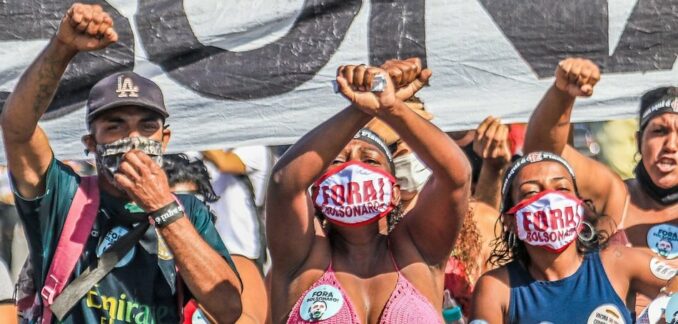Masses battle rightist regimes in Colombia, Brazil, Chile
Ongoing struggles in three South American countries show the general uprising that began in 2019 is still challenging right-wing ruling groups that had resumed control of governments.

“Bolsonaro out!” Ten thousand demonstrated in Rio de Janeiro, May 29.
A look at events in Colombia, Brazil and Chile demonstrate that the struggle continues. Up to this point, the axis of the mass movement has been to remove the right-wing ruling groups controlling the governments. It has not yet reached the level of an open attempt to smash state power — the army, courts and police that the ruling oligarchy in each country controls.
Colombia − repression and resistance
A general political strike that began April 28 has put ruling circles in Colombia in turmoil for over a month, as it has drawn more and more sectors of Colombian society into activity. News and analysis from progressive media in the South American region oscillate between reporting President Iván Duque’s brutal military repression and documenting the courage of Colombia’s mass movement in continuing to defy this repression.
According to a report in resumenlatinoamericano.org May 29, during the month of strike actions, Colombia’s police — especially the fascist ESMAD or anti-riot cops — and right-wing death squads killed at least 69 people, wounded 28,000 and disappeared between 89 and 346 people.
Along with this repression, as the writer Fernando Rubio in lahaine.org acknowledges in his recent article: “For the first time in the history of the nation, a general political strike focuses on paralyzing the economy and ceases to be a marginal protest phenomenon, to challenge and strike at the central core of oligarchic domination.
“This process puts in a strategic place the working class and the rest of the mass of workers who — allied with the youth, the Indigenous Minga, the middle classes and the peasant masses — have focused the current movement on the terrain of the dispute for power to dislodge from the vital points in the regime of domination, the oligarchic clique that appropriates the national wealth.”
This heroic struggle has awakened support among organizations worldwide that speak in the name of the working-class revolution. Some 28 such organizations, including Workers World Party and the Party of Liberation in Argentina, recently signed a statement expressing “sympathy toward the Colombian people, with special respect and value for the mass of youth who are on the first line of street fighting. And our greetings in solidarity with combative social and political organizations, who are committed to the uprising before talking with Duque, looking for parliamentary or electoral advantages.
“As well as condemning Duque’s current repression, we also repudiate the repression against social leaders and former demobilized guerrillas, as this totally broke the 2016 Peace Accords signed with the FARC-EP — the regime never signed an accord with the ELN.” [Both the FARC-EP and the ELN were organizations engaged in guerrilla war against the rightist regime]
This is only one of many such statements condemning the Colombian regime, its position as lackey to U.S. imperialism and defending human rights in Colombia.
Brazil − Bolsonaro out!
In more than 200 cities of Brazil, thousands of demonstrators demanded the impeachment of President Jair Bolsonaro, whom they accuse of criminally mismanaging the Corona pandemic crisis, which has already killed at least 460,000 of Brazil’s 211 million people. Photos of protests — which reached over 10,000 people in Rio de Janeiro alone — showed signs calling Bolsonaro’s actions “genocide.”
The leftist organizations and student movements calling the protests distributed protective masks and disinfectant gel and called on the demonstrators to keep their distance.
Bolsonaro’s approval ratings are currently the worst since he took office on Jan. 1, 2019, and recent polls show that former President Luis Ignacio “Lula” da Silva would outpoll him by about 55% to 34% in a 2022 election. Bolsonaro won the 2018 election only because a conspiracy involving the Brazilian judiciary put Lula in prison and disqualified him from running for president or even campaigning for the Workers Party (PT) candidate. Lula has since been vindicated and released from prison.
Chile − constitutional elections
In Chile, popular street actions have been taking place since October 2019, and in mid-May these led to surprising electoral results throughout the country. Often in revolutionary street actions — which in Chile, as in Colombia, the state has met with brutal repression — the more active sectors of society, often the youth, go far ahead of what the masses of voters are ready for.
The May 16 elections, however, reflected the changes in consciousness brought about by more than a year and a half of street actions. Argentine analyst Atilio Boron wrote in his May 19 article in lahaine.org, “Finally on Sunday [May 16] the result was a categorical triumph for the left and a crushing defeat for the right.”
Fewer than a third of the seats went to right-wing parties, which means these parties will be unable to veto changes to the fascist-era Constitution. Boron called it “the worst election of the right wing since 1965.”
“There were other equally emblematic defeats,” wrote Boron, “such as the one experienced in a traditional (and strategic) bastion such as the Mayor’s Office of Santiago, no less, which elected Irací Hassler, a young communist who defeated the incumbent Felipe Alessandri, grandson of the conservative former president Jorge Alessandri, who had run for reelection. Or the overwhelming victory of Daniel Jadue, communist mayor of the commune of Recoleta, north of Santiago, who won with 65% of the votes and is emerging as one of the best positioned pre-candidates for the presidential election to be held in November of this year.”

